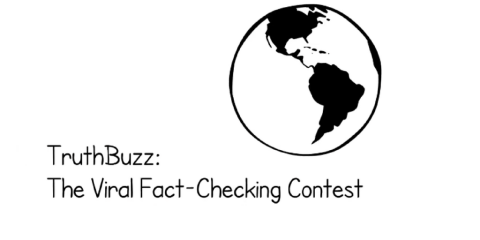
Caricatures of politicians, time-lapse videos and an app modeled on a classic video game were among the winners of TruthBuzz, the Viral Fact-Checking Challenge.
Organized by the International Center for Journalists (ICFJ) with support from the Craig Newmark Foundation, the TruthBuzz contest aimed to find new ways to help verified facts reach the widest possible audience. The competition sought creative solutions to take fact-checking beyond long-form explanations and bullet points.
A distinguished panel of judges – leaders at digital media companies including Facebook, First Draft News, Fusion Media Group and Google News Lab – selected teams from newsrooms and civil society organizations in Argentina, Italy, Georgia and Mexico as winners of the contest.
The winning entries used humor, animation and social media campaigns to help the facts travel far and wide. Each tackled different falsehoods, but all provided engaging, visual and interactive stories that are instantly understandable and shareable. The approaches also are easily adaptable by other news media working to make the truth go viral, a key goal of the contest.
Want to do similar projects on your news or fact-checking site? ICFJ is creating a quick-reference guide with advice from each of the award-winners. Sign up to receive the guide when it is released.
The winners are:
1st Place (USD $10,000):
Country: Italy
Giovanni Zagni and Lorenzo Catini of Pagella Politica an independent site devoted to political fact-checking.
A series of short and engaging videos which evaluate politicians’ claims by working out the math in chalk on a blackboard. When the vice president of Italy’s Chamber of Deputies said that more members of his political party had earned university degrees than their colleagues in rival parties, this one-minute timelapse video illustrated why that claim was false.
The team found that these videos were shared more widely and reached a broader audience than long, fact-checking articles. Other organizations saw the videos and got in touch about potential partnerships. The team is now working on another round of videos.
The team found that videos are particularly useful even for complex content such as debunking false claims. Make your own version of a freehand video on blackboard, in timelapse.
2nd Place (USD $5000):
Country: Argentina
The Team:
Laura Zommer, Pablo M. Fernández, Matías Di Santi, Ariel Riera and Ezequiel Apesteguía of Chequeado, an independent, nonprofit news organization and Latin America´s first fact-checking site.
The Entry:
Humorous animated caricatures, tailor-made for social media platforms, fact-check the claims made by politicians.
The Impact:
These videos put verified facts in front of both loyal and new audiences, and got them sharing the content on social media.
Tip from the Team:
To ensure a consistent voice throughout the project, appoint one editor who will be involved in it from the beginning.
3rd Place, Tie (USD $2500):
Country: Mexico
The Team:
Tania L. Montalvo, Alan Hernández, Alejandra Arteaga, Alejandro Angeles, Arturo Ángel, Arturo Daen, Daniel Moreno, Elizabeth Cruz Larios, Eréndira Aquino, Francisco Sandoval, Iván Alamillo Suárez, Jesús Santamaría Reséndiz, José Beltrán, Karla Casillas Bermúdez, Lizbeth Padilla, Mael Vallejo, Manu Ureste, Montserrat Sánchez, Nayeli Roldán, Nina Lopez, Omar Bobadilla, Paola Alín, Paris Martínez, Pedro González Moctezuma, Rodrigo Crespo Esquivel and Yosune Chamizo collaborated on behalf of five Mexican news outlets: Animal Político, AJ+ Español, Cultura Colectiva Noticias, The HuffPost México, and Vice News en Español.
The Entry:
A social media campaign that deploys video, graphics, illustrations and GIFs to show whether a particular politician has kept campaign promises. For example, when the governor of the country’s most-populous state promised to provide free education to the state’s indigenous population, this video showed that fewer than 15 percent of that demographic group received the promised scholarships.
The Impact:
The state government, which had earlier claimed to have given about 12,000 scholarships to students with indigenous heritage, revised its estimate to about half that number.
Tip from the Team:
If your budget is limited or your staff is small, bring together people from multiple news outlets and civil society organizations to tackle a shared project and broaden your project’s reach on social media.
3rd Place, Tie (USD $2500):
Country: Georgia
The Team:
Nino Macharashvili, Teona Tomashvili, Ia Ninoshvili, Goga Gorgodze and Anton Kamaryan of ForSet, a nonprofit organization specializing in effective communications for social issues using data, design and technology.
The Entry:
A mobile gaming app, now in the prototype stage, for Android devices. When players successfully tell fact from fiction, they’ll catch ducks and advance to more difficult levels in the game. The game, “Quack Hunt,” is a take on the classic Nintendo video game “Duck Hunt.”
Tip from the Team:
Collaborate with designers and game developers to create an educational and entertaining product.
Media Contact Erin Stock, 202-349-7636, estock@icfj.org.
About ICFJ To meet the urgent need for reliable information, ICFJ promotes a professional journalism whose primary goal is to seek the truth. We help journalists use best practices and new technologies to improve the quality of news media. We believe that better journalism leads to better lives.
Follow us on Twitter at @ICFJ